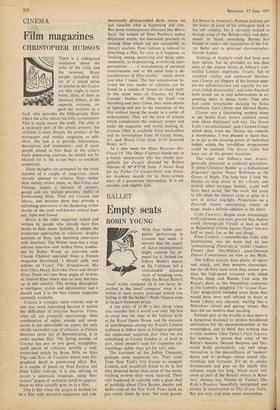CINEMA
Film magazines
CHRISTOPHER HUDSON
There is a widespread confusion about the roles of the critic and the reviewer. Many people, including writ- ers of a recent series
of articles in the Guard- ian who ought to know
better, think of them as identical. Others, at the opposite extreme, re- gard the reviewer as a hack who provides the bibliography from which the critic selects his lofty comparisons. This is much nearer the truth. The critic is a necessary part of the artistic process; the reviewer is more directly the product of the newspaper and weekly magazine or talk- show. His task is to provide information, description and impression: and if more people attend to him than to the critic's more penetraing analyses, he should not be blamed for it. He is not there to establish credentials.
These thoughts are prompted by the latest number of a couple of magazines which bravely attempt to criticise films—rather than merely review them, or, like Films and Filming, supply a mixture of reviews, gossip and coy 'picture previews' (stills) of forthcoming films. They are Cinema and Movie, and between them they provide a refreshing alternative to the deadening ortho- doxies of the most well-known critical jour- nal, Sight and Sound.
Movie is the older magazine, edited and written by people who already have -film books to their name. Suitably, it adopts the traditional approaches to criticism : lengthy analyses of films, and searching interviews with directors. The Winter issue has a mag- nificent interview with Arthur Penn, conduc- ted by Robin Wood, an interview with Claude Chabrol reprinted from a French magazine (translated, I should add), and articles on Topaz, The Arrangement, Ma Nuit Chez Maud, Zabriskie Point and Model Shop. There are also three pages of reviews of festival films which may or may not turn up in this country. The writing throughout is intelligent, stylish and informative; and I should rank it as the best cinema magazine currently available.
Cinema is younger, more volatile, and in one way more interesting because it tackles the difficulties of criticism head-on. Films, after all, are primarily entertaining; their combination of sights, sounds and move- ments is not assimilable on paper; the only wholly successful type of criticism, as French directors never tire of demonstrating, is to make another film. The Spring number of Cinema has one or two good, straightfor- ward pieces of criticism, notably a well- researched article by Brian Mills on Jean Vigo and Zero de Conduite which uses bio- graphical detail to penetrating effect. But, as a couple of pieces by Noel Purdon and Peter Gidal indicate, it is also striving to invent a cinematic language, using film- makers' jargon of technical detail to approx- imate to what actually goes on in a film.
This is fine when the jargon is latched on to a film with narrative sequences and con- ventionally photographed shots, where we can visualise what is happening and why. But some contemporary directors like Berto- lucci, the subject of Noel Purdon's rather disjointed article, are interested precisely in making films which are not susceptible to literary analysis. Peter Gilman is reduced to describing a film, his own as it happens, as `looking, seeing, perceiving and being open, constantly, to re-perceiving, re-evolving one's perceptions . . . a re-evaluation of personal consciousness and at the same time a de- mystification of (film-)reality,' which shows you what I mean. The best compromise be- tween the two modes of criticism can be found in a couple of 'essays in visual style' in the same issue of Cinema, by Fred Camper. Studies of films by Josef von Sternberg and Jerry Lewis, they relate details of lighting and sets to the intentions of the film without losing the reader in a welter of technicalities. They are the kind of articles which complement the ordinary review and make the magazine well worth looking at. Cinema (30p) is available from booksellers and on subscription from 10 Greek Street, WI, and Movie (25p) from 23-29 Emerald Street, .wc 1.
In a thin week for 'films, Brewster Mc- Cloud ('x' The Other Cinema) stands out as a funny, occasionally silly but wholly sym- pathetic feu d'esprit directed by Robert Altman of M*A*S*H fame. I Never Sang for my Father ('a' Cameo-Poly) won thirty- six Academy awards for its finely-written story of a parent-son relationship. It is ad- mirable, and slightly dull,


































 Previous page
Previous page